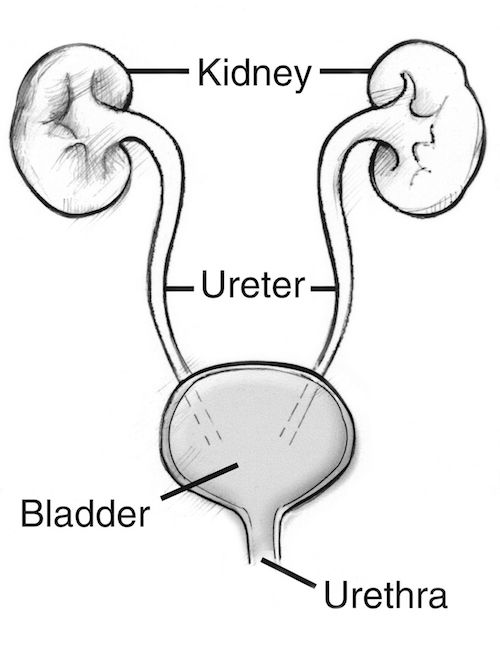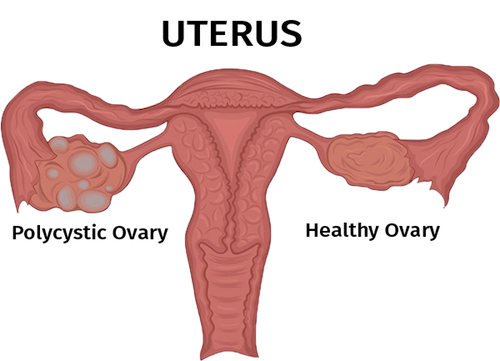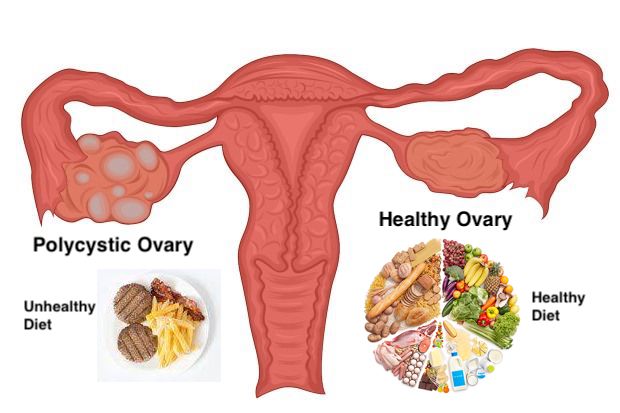Table of content
#2 Vyayama or Physical Exercise:
#3 Stress Management Through Yoga, Meditation and Sleep:
#4 Drink Honey and Lemon Water in Morning:
# 6 Include Spices in Your Diet:
# 7 Use Jeera and Turmeric Mix
In a world increasingly drawn to natural wellness, the value of home remedies for managing Polycystic Ovary Syndrome (PCOS) cannot be underestimated. These remedies can play a substantial role in not only managing symptoms but also promoting overall health.
Home remedies for this condition align closely with adopting a healthier lifestyle. However, they should complement and not replace professional medical advice. Given the complexity of PCOS, a multifaceted approach, inclusive of traditional medical interventions and lifestyle changes, is often necessary for optimal management.
Related Article
Best Ayurvedic Medicine PCOS / PCOD
Home remedies can be an effective way to manage Polycystic Ovary Syndrome (PCOS) symptoms in conjunction with traditional medical treatments. Here are five potential approaches:
#1 Ahara or Dietary Changes:
Polycystic Ovary Syndrome, a prevalent endocrine disorder in women of reproductive age, often requires lifestyle adjustments for optimal management. Among these, dietary changes hold paramount importance. They not only help in managing symptoms but also support overall well-being.
Diet is known as aahara in ayurveda. Ayurveda acharyas give utmost importance for diet habits that help to prevent diseases. PCOS is not an exception to this.
Embracing a diet rich in whole foods, particularly those high in fiber, can significantly aid those dealing with this condition. Foods high in fiber help combat insulin resistance by slowing down digestion and reducing the impact of sugar on the blood, thus decreasing the risk of insulin spikes. Legumes, whole grains, fruits, and vegetables are excellent sources of dietary fiber.
Millets for PCOS
Barnyard Millet (Hindi: Jhangora; Tamil: Kuthiravaali; Telugu: Odalu)
Finger Millet (Hindi: Mandua; Tamil: Kelvargu; Telugu: Ragulu; Kannada: Ragi; Malayalam: Koovarugu)
Foxtail Millet (Hindi: Kangni; Tamil: Tenai; Telugu: Korra; Kannada: Navane; Malayalam: Thina)
Kodo Millet (Hindi: Kodra; Tamil: Varagu; Telugu: Arikelu; Kannada: Harka)
Little Millet (Hindi: Kutki; Tamil: Samai; Telugu: Sama; Kannada: Same; Malayalam: Chama)
Pearl Millet (Hindi: Bajra, Tamil: Kambu, Telugu: Gantilu, Kannada: Sajje)
Proso Millet (Hindi: Barri; Tamil: Panivaragu; Telugu: Varigulu; Kannada: Baragu)
Sorghum (Hindi: Jowar; Tamil: Cholam; Telugu: Jonna; Kannada: Jola; Malayalam: Cholum)
Protein is another crucial nutrient. Consuming lean proteins like fish, chicken, turkey, and tofu can help maintain a healthy weight and stabilize blood sugar levels, reducing the manifestations of this condition. Combining protein with each meal and snack can also offer prolonged satiety, preventing overeating and facilitating weight management.
Healthy fats, especially omega-3 fatty acids, are an important part of the diet. These fats have been linked to improved insulin sensitivity and reduced inflammation. Foods like avocados, nuts, seeds, and fatty fish are rich in these healthy fats.
It’s equally essential to limit the intake of processed foods and refined carbohydrates, as these can exacerbate insulin resistance. Replacing sugary beverages with water or herbal teas can be beneficial. Likewise, reducing the intake of high-glycemic index foods like white bread, potatoes, and white rice can help manage blood sugar levels.
Lastly, regular meal timings can also support hormonal balance and help maintain a steady blood sugar level. Avoiding long gaps between meals can prevent insulin spikes and crashes that can lead to overeating.
To sum up, thoughtful dietary changes can make a significant difference for individuals dealing with this syndrome. However, it’s essential to remember that nutrition is personal and there is no one-size-fits-all approach. The best diet for someone with PCOS is one that they can maintain long-term and which suits their individual health needs, lifestyle, and food preferences.
Foods to avoid in PCOS
Avoid foods that contain lots of starch like refined flour, polished rice etc. Strictly say no to sweets, sugar, bakery products, and junk food. Consuming junk foods increase the secretion of insulin which in turn stimulates the secretion of androgen and cause an imbalance of female hormone. Never consume foods that cause indigestion or bloating. Indigestion leads to the production of “ama” a body toxin that causes the imbalance of doshas when accumulated.
#2 Vyayama or Physical Exercise:
Texts of ayurveda stress on a regular habit of doing vyayama or exercising to keep body functions in optimum levels. Vyayama is a compulsory activity of dinacharya or ayurvedic daily routine.
Regular physical activity holds a pivotal role in the management of Polycystic Ovary Syndrome. The effectiveness of exercises in this context isn’t limited to weight regulation alone but extends to multiple facets of health, particularly those impacted by this condition.
Regular physical activity can help maintain a healthy weight, regulate hormones, and improve insulin sensitivity. Activities could range from brisk walking, swimming, cycling, to more intense workouts like weight lifting.
Weight management is the most evident benefit. Exercise helps to achieve and maintain a healthy weight, mitigating a common concern for individuals dealing with this health issue. Attaining a healthy weight can lessen the severity of symptoms and decrease the risk of associated complications, like type 2 diabetes and heart disease.
However, the importance of physical activity extends beyond weight control. Regular exercise improves insulin sensitivity, which can prove crucial in this context, as insulin resistance is often a contributing factor. By enhancing the body’s ability to use insulin effectively, exercise can help regulate hormonal balance, which can alleviate some of the symptoms associated with this condition.
In addition, exercise plays an essential role in mental health. Regular physical activity can reduce stress and anxiety levels while enhancing mood and overall well-being. This is particularly valuable, given that individuals with this condition often face elevated stress and mental health challenges.
Moreover, studies have suggested that consistent exercise can help regulate menstrual cycles and improve fertility. This is particularly beneficial as irregular periods and infertility are common issues associated with the syndrome.
Furthermore, strength training can also prove beneficial. This form of exercise not only aids in weight management but can also help regulate hormonal balance and improve metabolic health.
In conclusion, while managing this syndrome requires a comprehensive approach, exercise plays an integral role. It has a multifaceted impact, from regulating weight and hormonal balance to improving mental health and menstrual regularity. However, as with any health strategy, it’s essential to consult with a healthcare provider to devise a personalized and effective exercise regimen. It’s also crucial to remember that exercise should be complemented by a healthy diet and other lifestyle modifications for optimal management.
#3 Stress Management Through Yoga, Meditation and Sleep:
Techniques like yoga, meditation, deep breathing, and mindfulness can help manage stress levels, which is crucial as high stress can exacerbate PCOS symptoms.
When managing Polycystic Ovary Syndrome (PCOS), an often-underestimated facet is the impact of stress on symptom exacerbation. Holistic methods like yoga, meditation, and maintaining healthy sleep patterns can significantly influence stress levels, thereby playing a pivotal role in controlling this condition.
Stress prompts a cascade of physiological responses that can further imbalance hormones, intensifying symptoms such as irregular periods, acne, and weight gain. Thus, effective stress management becomes essential. Yoga, a mindful physical practice, serves as a dual tool in this regard. It encourages not only physical activity, thereby aiding weight management, but also helps reduce cortisol levels, the body’s primary stress hormone. Regular practice of yoga can enhance mood, improve hormonal balance, and support overall wellness.
Meditation, another mindful practice, focuses on calming the mind and reducing anxiety. It fosters mental tranquility, enabling individuals to better manage daily stressors that can trigger PCOS symptoms. Studies suggest that consistent meditation can positively impact the endocrine system, leading to improved hormonal balance. In addition, mindfulness-based practices like meditation can cultivate healthier eating behaviors, contributing to weight management.
Sleep is another cornerstone of stress management and overall health. Research indicates a clear link between poor sleep and hormonal imbalances, which can compound the challenges associated with this condition. Insufficient or irregular sleep patterns can exacerbate insulin resistance and hinder weight management efforts, further aggravating symptoms. Thus, maintaining regular sleep patterns and prioritizing adequate rest are integral to managing PCOS.
In conclusion, the integration of yoga, meditation, and good sleep hygiene can form a powerful triumvirate in the holistic management of PCOS. While these practices should not replace medical treatments, their role in reducing stress and promoting overall health makes them valuable adjuncts in managing this complex condition.
#4 Drink Honey and Lemon Water in Morning:
Lemon and honey with warm water is an excellent drink with various health benefits. Ayurveda acharyas describe the action of honey as “lekhana”. This means honey acts as a scraping agent. It scrapes fat, and toxins, from body channels. Add 1 teaspoon of honey and 2 teaspoons of lemon to a big glass of warm water. This has to be taken as the very first drink in the morning on an empty stomach. This drink flushes toxins, clears body channels, scrapes fat, and boosts metabolism. This is an excellent PCOS or PCOD ayurvedic treatment.
#5 Hydrate well:
Water is needed for all body functions. Reduction in water content imbalances body function. Likewise excess of water intake can be hazardous. Hence drink water in moderation. Around 3 liters of water per day is sufficient to keep the body healthy. Ayurveda Acharyas advise consuming 7-8 glasses of warm water every 2 hours to maintain the hormonal balance in PCOS. Warm water boosts metabolism increases body temperature and helps the body to function in an optimal condition
# 6 Include Spices in Your Diet:
Spices can be an important component of a healthy diet for women with PCOS. Here are some of the ways in which spices can be beneficial:
Anti-inflammatory properties: Many spices, such as turmeric, ginger, and cinnamon, have anti-inflammatory properties. Chronic inflammation is a common problem in women with PCOS, and these spices can help reduce inflammation and improve overall health.
Blood sugar regulation: Some spices, such as cinnamon, can help regulate blood sugar levels by improving insulin sensitivity. This can be particularly beneficial for women with PCOS, who are at an increased risk of insulin resistance and type 2 diabetes.
Flavor enhancement: Using spices to flavor meals can make healthy foods more palatable and enjoyable. This can help women with PCOS stick to a healthy diet and avoid high-calorie, high-sugar foods.
Thermogenic effect: Some spices, such as cayenne pepper, can have a thermogenic effect, which means they can increase metabolism and help with weight loss. This can be particularly beneficial for women with PCOS who struggle with weight management.
Antioxidant properties: Spices such as cloves and oregano have high levels of antioxidants, which can help reduce oxidative stress and improve overall health.
Spices like cinnamon (dalchini), Fennel seeds (saunf), Black cardamom (badi elaichi) , amla (Indian gooseberry), etc help in PCOS. These spices can be used in the form of powder or herbal tea.
It is important to note that while spices can be beneficial for women with PCOS, they should not be used as a substitute for medical treatment or a healthy diet. It is always recommended to consult with a healthcare provider or registered dietitian before making any significant changes to your diet or lifestyle.
# 7 Use Jeera and Turmeric Mix
Another PCOS or PCOD home remedy is Chewing ½ teaspoon of Jeera (cumin seeds) twice daily. It improves digestion and also reduces body fat and boosts its metabolism. You can add turmeric to dishes wherever possible. Turmeric helps to detox the liver and improves skin health.
#8 Spearmint Tea:
Spearmint tea is often touted as a beneficial home remedy for Polycystic Ovary Syndrome (PCOS), primarily due to its potential impact on hormone levels. The core challenge of PCOS is the hormonal imbalance it presents, including elevated levels of androgens like testosterone. These heightened androgen levels contribute to many symptoms of this condition, including hirsutism (excessive hair growth), acne, and menstrual irregularities.
Several studies suggest that spearmint tea might have anti-androgenic properties. In particular, they indicate that regular consumption of this herbal infusion might help decrease testosterone levels in women with PCOS, thus potentially ameliorating some symptoms. Research has also hinted at spearmint’s potential to positively influence insulin resistance, another critical aspect of PCOS.
However, while these findings are promising, they are preliminary. Most of these studies have been relatively small and short-term. As a result, more extensive, long-term research is required to conclusively establish spearmint tea’s efficacy in managing PCOS and its optimal dosage.
In conclusion, spearmint tea represents a natural approach to managing PCOS. Although it should not replace traditional medical treatments, it might serve as a complementary addition to a comprehensive management plan, subject to a healthcare provider’s advice.
#9 Cinnamon Supplements:
Polycystic Ovary Syndrome (PCOS) is a complex endocrine disorder often marked by insulin resistance. Interestingly, cinnamon, a commonly used spice, has gained attention for its potential role in managing this condition.
Cinnamon supplements are believed to have insulin-sensitizing properties, which can be beneficial for women with PCOS who often struggle with insulin resistance. By improving insulin sensitivity, cinnamon might contribute to regulating menstrual cycles, a common concern for individuals with this condition.
Research has also suggested that cinnamon could play a role in weight management, another crucial aspect of managing PCOS symptoms. Studies indicate that cinnamon may help decrease body mass index (BMI) and fat mass, which can be particularly beneficial considering that weight gain and difficulty losing weight are prevalent among those with PCOS.
However, while the initial findings seem promising, more research is needed to conclusively establish the benefits and proper dosing of cinnamon supplements for PCOS management. Also, it’s worth noting that cinnamon should be seen as an adjunct to other therapeutic strategies such as a balanced diet, regular exercise, and prescribed medications, rather than a standalone treatment.
Finally, as with any supplement, it’s essential to consult with a healthcare provider before starting cinnamon supplementation to ensure it’s appropriate and safe for individual health circumstances.
Please note that while these remedies may help manage symptoms, they aren’t a replacement for medical treatment. It’s essential to consult with a healthcare provider for comprehensive management of PCOS.
( WhatsApp + 91 6360108663/ Dr.Savitha Suri to know more about ayurvedic treatment for PCOs or PCOD)
Author: Dr.Savitha Suri






